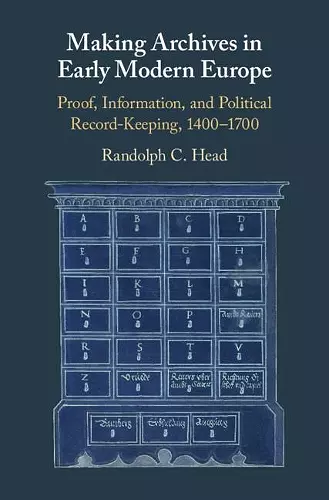Making Archives in Early Modern Europe
Proof, Information, and Political Record-Keeping, 1400–1700
Format:Hardback
Publisher:Cambridge University Press
Published:27th Jun '19
Currently unavailable, and unfortunately no date known when it will be back
This hardback is available in another edition too:
- Paperback£36.99(9781108462525)

Compares the archives of European states after 1500 to reveal changes in how records supported memory, authority and power.
Drawing on a wide range of archives, from Lisbon to Vienna to Berlin, this detailed comparative study shows how recorded political knowledge was understood, organised and managed in chancelleries and repositories across Western Europe from the High Middle Ages to the Enlightenment.European states were overwhelmed with information around 1500. Their agents sought to organize their overflowing archives to provide trustworthy evidence and comprehensive knowledge that was useful in the everyday exercise of power. This detailed comparative study explores cases from Lisbon to Vienna to Berlin in order to understand how changing information technologies and ambitious programs of state-building challenged record-keepers to find new ways to organize and access the information in their archives. From the intriguing details of how clerks invented new ways to index and catalog the expanding world to the evolution of new perspectives on knowledge and power among philologists and historians, this book provides illuminating vignettes and revealing comparisons about a core technology of governance in early modern Europe. Enhanced by perspectives from the history of knowledge and from archival science, this wide-ranging study explores the potential and the limitations of knowledge management as media technologies evolved.
'Head's reach is remarkable as he tracks the concepts and practices, the people and motives behind the explosive growth of administrative archives between 1200 and 1700 across a wide swath of European polities. He combines deep dives into little-known sources with judicious reflection on the impact of archives on both early modern governance and current historical practice.' Ann Blair, Carol H. Pforzherimer Professor, Harvard University, Massachusetts
'This book provides a new understanding of different modes of organizing records and archives as shaped by medial and governance processes in Europe, between 1400 and 1700. Archives are presented as cultural and political sites being shaped by cultural and political actors. Randolph Head shows how the comparative approach - spanning places, times, languages, and cultures - is a powerful analytical tool and an invaluable method of historical investigation.' Eric Ketelaar, Universiteit van Amsterdam
'A remarkably learned exploration of finding tools, record-keeping methods and pre-modern archival theories across many European countries. Randolph Head brings order to the expanding field of the history of archives by tracing the sometimes desperate efforts of late medieval and early modern archivists who tried to order their own growing masses of documents. Highly recommended.' Filippo de Vivo, Birkbeck, University of London
'This in-depth, scholarly history is ideal for librarians, archivists, graduate students, and scholars of history, particularly the history of books.' A. H. Widder, Choice
'… the main merit of the book lies in its finely calibrated balance between a general discourse on the role played by archives in the formation of European statehood and the presentation of specific documents, archives, and inventories.' Marco Cavarzere, German Historical Institute London Bulletin
'The book is a tremendous contribution to the history of archives and of early modern Europe.' Francis X. Blouin Jr., American Historical Review
ISBN: 9781108473781
Dimensions: 235mm x 158mm x 21mm
Weight: 730g
364 pages